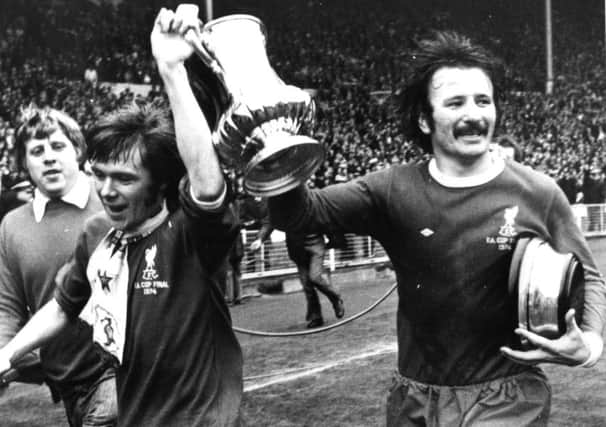Obituary: Brian Hall, former footballer


Brian Hall, who has died after a lengthy and courageous battle against leukaemia, was one of the overlooked, but key components in Bill Shankly’s second great Liverpool team of the early 1970s. He never touched the heights of team mates such as John Toshack or Kevin Keegan, but his industrious box-to-box midfield running and sheer enthusiasm was a crucial ingredient in the team’s success.
Like many unsung “English” midfielders, Hall was Scottish. He was born in Glasgow, but the Hall family moved to Preston where he was raised and educated, at Preston Grammar School, where he was an outstanding player in the school team.
Advertisement
Hide AdAdvertisement
Hide AdPreston North End kept a close watch on local talent and the schoolboy Hall was soon training at Deepdale in the evenings, when Sir Tom Finney would be on hand to lend inspiration.
North End wanted to take him into their full-time youth development programme, but his physics teacher at Preston Grammar School convinced his parents, and Brian, that any boy who could, as he did, take his O Levels a year early had the potential to go to university.
He turned down North End’s overture and headed to Liverpool University to study mathematics. This was an easy decision to make in 1964, at the height of Beatlemania and the Merseybeat boom.
He was content to play football for the university, but Derek Thompson, one of his friends, knew Phil Thompson, the future Liverpool and England captain.
The unrelated Thompsons had a conversation and Hall was invited to Mellwood, Liverpool’s training ground. Impressing in a trial, he signed for the club as an amateur.
To help eke out his grant, Hall took a part-time job as a conductor on Ribble Buses, and, arriving at Mellwood in uniform one morning for pre-season training, he was asked by Bill Shankly – who knew him as “the student boy”: “Do you need a degree to be a bus driver these days, son”?
Hall explained about the part-time job and that he came from Preston – this, and an admitted admiration for Finney, immediately elevated him in Shankly’s eyes; the manager had, after all, spent his best playing years at Deepdale and Hall became a favourite.
Graduating with a Bsc in maths, Hall signed as a full-timer in 1968, being dubbed “Little Bamber” in the dressing room. His fellow graduate, Steve Heighway, was “Big Bamber”, in a reference to the then University Challenge host, Bamber Gascoigne.
Advertisement
Hide AdAdvertisement
Hide AdHe did not have long to wait for his first-team chance, making the first of his 224 Liverpool appearances, as a replacement for Roger Hunt, against Stoke City in April, 1969.
It took him some time to become a regular, however, but his standing within the club grew after his match-winning goal against Everton in the 1971 FA Cup semi-final. This was the first of the 24 goals he would score for Liverpool.
Among his honours during his eight-year playing stint at Anfield were League Championship medals in 1973 and 1976 and an FA Cup Winner’s medal in 1974, when his outrageous dummy set Keegan up to score the opener in Liverpool’s 3-0 demolition of Newcastle United in what was Shankly’s last game as Liverpool manager.
He also won two Uefa Cup Winner’s medals – without playing more than 28 minutes in the games.
In 1973 he started the first leg of the two-legged final, against Borussia Mönchengladbach, but the game was abandoned after 28 minutes, during which Shankly had spotted what he believed to be a weakness in the Borussia ranks; so, for the replay the following night, he left-out a very disappointed Hall and put in John Toshack – to do a job on Borussia’s Gunter Netzer.
The plan worked and, realising that Shankly had been right, Hall reluctantly accepted his demotion.
In 1976, with Bob Paisley now the manager, Hall played his part in getting Liverpool to the final, where they faced Club Brugge, but he was an unused substitute in both legs and coming to the end of his Liverpool playing career.
He moved on to Plymouth Argyle at the end of that season, before returning to Lancashire to wind down his career at Burnley, retiring in 1980. Going home to Preston, he had a short spell as a teacher, before joining Preston Borough Council as head of leisure, where he took great pride in helping to ensure public access to the ground, to play on the artificial surface which North End had laid down.
Advertisement
Hide AdAdvertisement
Hide AdBut he was recalled to Liverpool to work in the club’s Community Department, doing PR work and being the Anfield-based liaison officer with the worldwide network of Liverpool FC supporters clubs.
This was a job Hall particularly loved and he was a very popular figure with the fans, both regular Koppites and Liverpool ex-pats around the world.
The bombshell discovery of his leukaemia meant, however, he had to take early retirement in 2011. He battled the disease as wholeheartedly as he had fought for the ball in midfield, but lost that fight earlier this month.
Brian Hall died peacefully at his home in Preston. He is survived by wife Mary, daughters Jane and Elizabeth, son Andrew and grandchildren Thomas, Finlay, Katie, Jack, Reece, Olivia and Grace.
Many Scots footballers have done great things in the service of Preston and Liverpool.
Brian Hall might not have the playing escutcheon of Shankly, Docherty, Beattie, St John, Hansen or Dalglish, but, like them, he will be fondly remembered on Merseyside and in Lancashire.